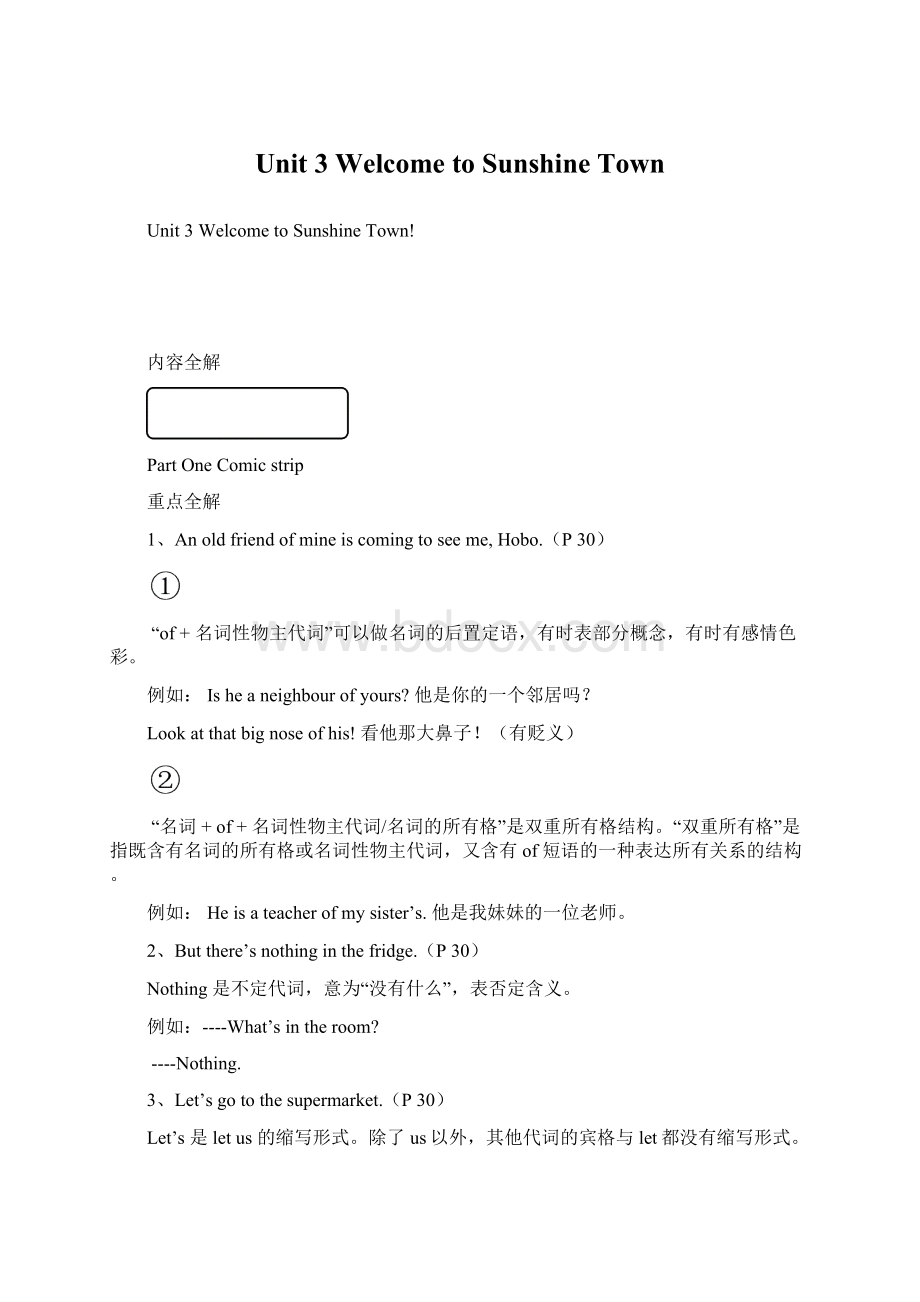Unit 3 Welcome to Sunshine Town.docx
《Unit 3 Welcome to Sunshine Town.docx》由会员分享,可在线阅读,更多相关《Unit 3 Welcome to Sunshine Town.docx(13页珍藏版)》请在冰豆网上搜索。

Unit3WelcometoSunshineTown
Unit3WelcometoSunshineTown!
内容全解
PartOneComicstrip
重点全解
1、Anoldfriendofmineiscomingtoseeme,Hobo.(P30)
“of+名词性物主代词”可以做名词的后置定语,有时表部分概念,有时有感情色彩。
例如:
Isheaneighbourofyours?
他是你的一个邻居吗?
Lookatthatbignoseofhis!
看他那大鼻子!
(有贬义)
“名词+of+名词性物主代词/名词的所有格”是双重所有格结构。
“双重所有格”是指既含有名词的所有格或名词性物主代词,又含有of短语的一种表达所有关系的结构。
例如:
Heisateacherofmysister’s.他是我妹妹的一位老师。
2、Butthere’snothinginthefridge.(P30)
Nothing是不定代词,意为“没有什么”,表否定含义。
例如:
----What’sintheroom?
----Nothing.
3、Let’sgotothesupermarket.(P30)
Let’s是letus的缩写形式。
除了us以外,其他代词的宾格与let都没有缩写形式。
Letsb.dosth.意为“让某人做某事”,do是省略to的动词不定式,作sb.的宾语补足语。
其肯定回答一般为“OK.”“Allright.”;否定回答一般为“Sorry,I…”。
例如:
----Let’sgohome.
----Allright.
----Let’sgoandseeUncleWang!
----OK.
Letmelookatit.
4、Weonlyhavefiveyuan,Eddie.(P30)
Only此处用作副词,意为“只,仅仅,才”。
例如:
Tomisonlyfiveyearsold.
Only还可用作形容词,意为“唯一的,独有的”,常与单数可数名词连用。
当only与复数可数名词连用时,意为“仅有的”。
例如:
JackisGreens’onlyson.
5、Isitenoughforatinofdogfood?
(P30)
atinof“一听,一罐”。
It’satinofmeat.这是一罐肉罐头。
I’dliketwotinsofcolatodrink.我想要两听可乐喝。
6、Maybewecanorderapizza…也许我们可以订购一个比萨饼…(P30)
(1)maybe副词,意为“大概,可能,或许”,与perhaps同义。
Maybewecaninvitethemtohavedinnerwithus.
Maybeyouareright.
辨析:
maybe;(may是情态动词,be是连系动词。
maybe意为“可能是”)
ItmaybeMary’sbook.Maybeyoursisinyourbag.
(2)order及物动词,意为“订购,预订”
Let’sordersomefood.让我们点餐吧。
拓展:
(1)order及物动词,意为“命令”
IfyoumakeanymorenoiseI’llorderyououtoftheroom.
(2)order名词,意为“订单,订货”。
Thisisanorderforfivehundredbags.
(3)order名词,意为“次序,顺序”。
Pleaseputthemintherightorder.
PartTwoWelcometotheunit
重点全解
1、IenjoyChinesefood.(P31)
Enjoy及物动词,意为“享…之乐,喜爱,喜欢”;后接名词、代词或动名词。
例如:
Doyouenjoyyourschoollife?
Myelderbrotherenjoyshelpingothers.
[拓展]:
enjoyoneself=haveagoodtime=havefun玩的愉快
Doyouenjoyyourselvesatweekends?
2、Ilovewatchingfilms.(P31)
Watch及物动词,意为“看,观看”。
例如:
IwatchTVeveryday..
Iwanttowatchthebasketballgame.
[拓展]:
1.watchsb.dosth.看见某人做过某事
watchsb.doingsth.看见某人正在做某事
例如:
Ioftenwatchhimdanceinthepark.
Iwatchedthemplayingfootballatsixyesterdayafternoon.
2.watch名词,意为“手表”。
Thisismywatch.
PartThreeReading
重点全解
1、TherearelotsofthingstodoinSunshineTown.(P32)
“thereis/are+名词+todo….”意为“有…可做”,其中动词不定式用来修饰它前面的名词,作后置定语,且两者之间存在逻辑上的动宾关系。
例如:
Thereissomehomeworktodothisweekend.这个周末有一些家庭作业要做。
Therearesomethingstobuyinthetown.镇里有许多要买的东西。
2、…stayinaquiettown?
(P32)
quiet形容词,意为“安静的”,既可以作定语也可以作表语。
例如:
Sheisaquietgirl.她是一个安静的女孩。
3、Theairisfreshhere.(P32)
fresh形容词,意为“新鲜的,清新的,凉爽的”,在句中作定语或表语。
例如:
Freshmilkisgoodforchildren.鲜奶对孩子们有益。
4、Beijingduckisveryfamous.(P32)
famous形容词,意为“著名的,有名的”,既可以作表语,也可以作定语。
其同义词是well-known,反义词是unknown.
例如:
Chinesesilkisfamousaroundtheworld.中国丝绸世界闻名。
【拓展】:
1.befamousfor…“因…而著名/出名”。
2.befamousas…“作为…而出名”。
5、IfyoudonotlikeChinesefood,therearesomeWesternrestaurantstoo.(P32)
1.这是一个复合句,句中含有一个if引导的条件状语从句。
此时,if意为“如果,假如”。
例如:
Ifyoucometothiscity,pleasecallme.如果你来到这个城市,请给我打电话。
【拓展】:
在含有if引导的条件状语从句的主从复合句中,主句用一般将来时,从句常用一般现在时表示将来。
Wewon’tgototheparkifitrainstomorrow.如果明天下雨,我们就不去公园了。
3.too副词,意为“也,还”,一般位于肯定句句末。
MikespeaksEnglish.AndhecanspeakFrenchtoo.迈克讲英语,他也会讲法语。
6、WhynotvisitourlocaltheatreandenjoyBeijingopera?
(P32)
Whynotdosth.?
意为“为什么不做某事呢?
”,用于提出建议,not后接动词原形。
例如:
Ifyouarefreetonight,whynotwatchafilmwithme?
7、…don’tmisstheopenshowsthere.(P32)
miss及物动词,意为“错过,未看到,未赶上”,后接名词、代词或动名词。
例如:
Boblovesfootball.Henevermissesanyfootballgame.
【拓展】:
1.miss及物动词,意为“想念,思念”,后接名词,代词或动名词。
Shemisseshermotherverymuch.
2.Miss表示“小姐”之意时,应该大写首字母。
MissWangisnotintheofficenow.
8、Wearelookingforwardtomeetingyousoon.(P32)
1.lookforwardto(doing)sth.意为“盼望(做)某事”,其中”to”为介词,其后跟名词或动名词形式。
例如:
MostchildrenlookforwardtotheSpringFestival.
Theboysarelookingforwardtohavingaparty.
3.soon副词,意为“不久”,指现在或指定时间后不久。
例如:
MrLiisexcitedbecausehewillhavealongholidaysoon.
[拓展]:
howsoon意为“多快,多久”,常对“in+段时间”进行提问。
例如:
----Howsooncanyoufinishit?
你多久能完成它?
----Inaweek.一周后。
PartFourGrammar
重点全解
1、Neil’smotheriscallinghimfromtheUK.(P35)
Call此处用作及物动词,意为“打电话”。
例如:
MyfriendoftencallsmefromBeijingatweekends.
[拓展]:
1.call及物动词,意为“叫,呼唤”。
Callataxiforme.
2.call及物动词,意为“称…为…”。
HisfriendscallhimBob.
3.call还可用作名词,意为“打电话,通话”。
Thereisacallforyou,MrBlack.
2、Therearelotsofniceshopsinourtown.(P35)
Lotsof=alotof意为“许多”,后面既可接可数名词复数,又可接不可数名词,多用在肯定句中。
在疑问句中和否定句子中常用many或much,many后接可数名词复数,而much后接不可数名词。
例如:
Wehavelotsof/alotofnewbooks.
Hedoesn’thavemanyfriendshere.
Thereisn’tmuchmilkinthebottle.
3、They’reallovertheplace.(P36)
Allover意为“遍及”,over在此处作介词,意为“遍及”。
例如:
alloverChina遍及全中国allovertheworld全世界
Scientistsfromallovertheworldarehereforanimportantmeeting.
重点全解
1、GotoHuangjiPalacetoseeworksofartat11a.m.(P38)
Worksofart意为“艺术品”,此处works是work的复数形式。
Work当“作品,著作”讲时,为可数名词。
例如:
WangGanglikestocollectworksofart.
I’dliketolearnmoreaboutChairmanMao’sworks.
[拓展]:
work意为“工作,劳动”时,为不可数名词。
Theyhavemuchworktodo.
2、That’sfine.(P38)
Fine形容词,意为“美好的,优良的,杰出的”。
例如:
Whatafineviewitis!
[拓展]:
1.fine形容词,意为“晴朗的”,用来形容天气时,和clear同义。
Whatafineday!
2.fine形容词,意为“安好的。
(身体)好的”,相当于well。
----Howareyou?
----I’mfine.
3、Howfarisitfromthehotel?
(P38)
Howfar意为“多远”,用于对距离进行提问。
例如:
----Howfarisitfromheretothepark?
----Itistwokilometers.
4、It’sabout40minutesbybus.(P38)
“itis+所需时间+(fromAtoB+)by+交通工具/onfoot.”是一个表达(从A地到B地)距离的句型,有时它可用“itis+所需时间名词的所有格+walk/ride/drive(fromAtoB).”替换。
例如:
ItisaboutfourhoursfromLianyungangtoNanjingbycar.
=Itisaboutfourhours’drivefromLianyungangtoNanjing.
5、We’llhaveagoodtimethere!
(P38)
Haveagood/great/wonderfultime意为“玩的开心、愉快”,其中的冠词a不可省略。
Haveagoodtime和havefun/enjoyoneself同义,其后都可以接doingsth.,意为“在做某事中过的愉快”。
例如:
LiMingishavingagoodtimeintheparknow.
Wehaveagoodtimecleaningtheclassroom.
PartSixTask
1、I’mgoingtoshowyouaroundmyhometown.(P41)
Showsb.around/round…意为“带领某人参观”
例如:
Thisafternoon,Iwillshowthevisitorsaroundourschool.
[拓展]:
1.show及物动词,意为“给…看”。
Showsb.sth.=showsth.tosb.给某人看某物
Pleaseshowmeyourticket.=Pleaseshowyourtickettome.
2.show可数名词,意为“展览”。
adolphinshow海豚展aflowershow花展beonshow展出
2、Everyday,Icansmelltheflowersandhearthebirdssing.(P41)
smell动词,意为“闻到,嗅到”。
IthinkIcansmellgas.我想我闻到了煤气味。
[拓展]:
1.smell作连系动词,意为“闻起来”,其后接形容词作表语。
Theflowerssmellgood.
2.smell作可数名词,意为“气味”。
Itgivesoffagoodsmell.
hearsb.dosth.意为“听见某人做某事”,暗示该动作已经完成或经常发生。
hearsb.doingsth.意为“听见某人正在做某事”,强调动作正在进行。
例如:
Shehearssomeonecomeintotheroom.
Whocanyouhearsinginginthenextroomnow?
[拓展]:
除hear外,see/watch/feel/notice等动作也有同样的用法。
3、Sometimeswerowaboatthere.(P41)
Sometimes副词,意为“有时”,相当于attimes。
例如:
Hesometimesgoestoschoolonfoot.
【辨析】:
sometimes,sometimes,sometime与sometime
sometimes
频率副词
有时
表示动作发生的不经常性,多与一般现在时连用,它可位于句首、句中或句末,对它提问用howoften
sometimes
名词短语
几次,几倍
其中time是可数名词,对sometimes提问用howmanytimes
Sometime
副词
某时
表示某个不确切或不具体的时间,常用于过去时或将来时,对它提问用when
sometime
名词短语
一段时间
表示“某一段时间”时,常常修饰延续性动词,对它提问用howlong
例如:
Shecomestovisitussometimes.她有时来看望我们。
LucyhasbeentoBeijingsometimes.露西去过北京几次了。
JackwillleaveforAmericasometimenextweek.杰克将在下周某个时候动身去美国。
Ineedsometimetodomyhomework.我需要一些时间来做作业。
4、Somefamiliesraisecows,andothersgrowwheat.(P41)
some…others…意为“一些……,另一些……”,表示除去一部分以后的另一些,但不是剩下的全部。
例如:
Somepeoplelikesinging,andotherslikedancing.
Therearemanypeopleonthetrain.Somearechatting;othersaresleeping.
[拓展]:
some…theothers…意为“一些……,其他的……”,表示一定范围内除去一部分后其余的全部。
Thereare40studentsinmyclass.SomeareAmericans,andtheothersareChinese.
5、Theyareallfriendly.(P41)
friendly形容词,意为“友好的”。
befriendlytosb.意为“对某人友好”,指对某人的态度好、热情,相当于bekindtosb.。
befriendlywithsb.意为“和某人关系好”或“与某人要好”,指的是两者的关系。
例如:
Myclassmatesareallfriendlytome.
He’snotveryfriendlytonewcomers.
Theclassmatesinourclassarefriendlywitheachother.
6、Usuallymymotherdrivesustheretodotheshopping.(P41)
Drive此处用作及物动词,意为“驾车送(人)”。
”drivesb.to+地点名词”意为“驾车送某人去某地”。
例如:
Myfatherbuysanewcar.Hewilldriveustoschooltomorrow.
7、Ihopeyoucancomeandvisitsoon!
(P41)
hope及物动词,意为“希望”,用于表示有可能实现的愿望,其后可接动词不定式作宾语,即hopetodosth.,意为“希望做某事”。
若表达“希望……”则需用”hope+that从句”。
例如:
IhopetogotoTibetsomedayinthefuture.
Ihopethatyoucanstudyharder.
[辨析]:
hope与wish
二者都可意为“想,希望”。
宾语都可以是todosth.,不能是doingsth.。
hope
hopefor+名词,可实现的愿望
hope+that从句,“希望……”,陈述语气
wish
wishfor+名词,难以实现的愿望
wish+that从句,“希望……”,虚拟语气
1.等一会儿
2.订购一个披萨
3.许多
4.…一罐…
5.想要
6.离…远
7.乘地铁
8.去购物
9.…欢迎到…
10..给某人打电话
11.我的一位老朋友
12.看一看
13.到处,遍及
14..为某人买某物
15.艺术品
16.…在…前面
17.玩得高兴
18.谈论
19.相互
20.在农场
21.购物
22.我家四周
23.踢足球
24.看一些精彩的电影
25.waitaminute等一会儿
26.orderapizza订购一个披萨
27.lotsof许多
28.atinof…一罐…
29.wouldlike想要
30.farfrom离…远
31.byunderground乘地铁
32.goshopping去购物
33.welcometo…欢迎到…
34.callsb.给某人打电话
35.anoldfriendofmine我的一位老朋友
36.lookat看一看
37.allover到处,遍及
38.buysth.forsb.为某人买某物
39.worksofart艺术品
40.infrontof…在…前面
41.haveagoodtime玩得高兴
42.talkabout谈论
43.eachother相互
44.onafarm在农场
45.dotheshopping购物
46.aroundmyhouse我家四周
47.playfootball踢足球
48.watchsomewonderfulfilms看一些精彩的电影
句型归纳
1..想要做某事
2.盼望(做)某事